Indicators For Setting Stop losses In Oil
Some indicators are used for setting stop losses taking away the need for crude traders to perform complex calculations on where to place these stop loss crude trade orders.
A trading systems trader can also place a stop loss order according to these indicators. Some indicators use mathematical equations to calculate where the order stop loss order should be set so as to provide an optimal exit. These indicators can be used as the basis for setting stop loss orders. These indicators follow price action of a oil instrument closely and define the boundaries which the prices should move along in. When the price moves outside these boundaries it is therefore best to close the open crude trades because price stops moving in that particular direction.
Some of the Technical indicators that can be used to set stop loss orders are:
Parabolic SAR Indicator
Parabolic SAR is like an Automatic Stop Loss Trading Order and TakeProfit Trading Order Indicator used to set a trailing price stop loss
Parabolic SAR provides excellent exit points.
In an upward trend, you should close long trades when the price falls below the Parabolic SAR indicator
In a downwards trend, you should close short trades when the price rises above the Parabolic SAR.
If you are long then the price is above the parabolic SAR, the SAR will move upward every day, regardless of the direction in which the price is moving. The amount the Parabolic SAR indicator moves up depends on amount that prices moves.
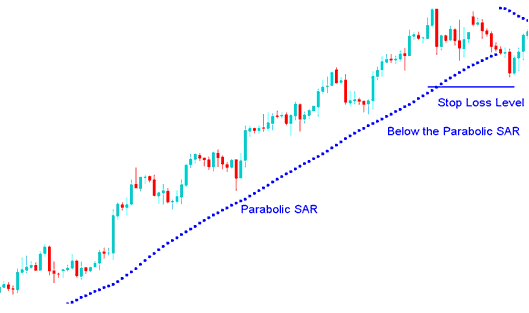
Parabolic SAR - Crude Oil Indicator - Automatic Stop Loss Trading Order and TakeProfit Trading Order Indicator
Picture of parabolic SAR and how it is used
Bollinger Bands Indicator
Bollinger bands indicator use standard deviation as a measure of volatility. Since standard deviations indicator is a measure of volatility, the Bollinger bands are self-adjusting meaning they widen during periods of higher volatility and contract during periods of lower volatility.
Bollinger Bands indicator consist of 3 bands designed to encompass the majority of a oil instruments price action. The middle band is a basis for the intermediate term trend, mostly it is a 20 day period simple MA, which also serves as the base for calculating the upper band and lower band. The upper band's and the lower band's distance from the middle band is determined by the price volatility.
Since these Bollinger bands are used to encompass the price action, the bollinger bands can be used by traders to set stoploss orders just outside the areas of the bands.
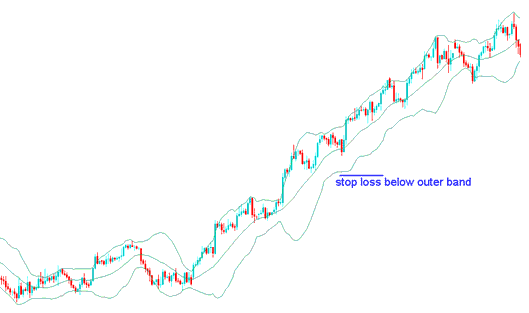
Bollinger Band Setting Stop Loss Trading Order Level - Bollinger Bands Technical indicator
Crude Oil Fibo Retracement Levels Indicator
Fibonacci retracement levels provide areas of support and resistance, these areas can then be used to set stoploss levels.
Oil Trading Fibonacci Retracement level 61.8 % is the most commonly used level for setting stop losses. A stop loss order should be set just below 61.8 % fib retracement level
The 61.80% Fibonacci retracement level indicator is used to set these orders since its rarely hit.
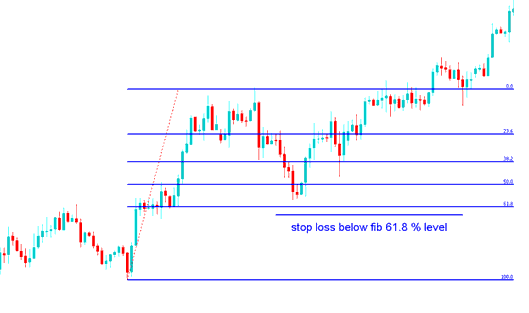
Fibonacci Indicator Stop Loss Order Setting at 61.80% Retracement Level
Fibonacci retracement level 61.8% - Fibonacci Indicator
Support and Resistance Levels Lines
Support and resistance levels can be used to set stop loss levels where the stop loss orders are set just above or below the support or resistance.
- Buy Trade - Stop Loss Trading Order set few pips below the support
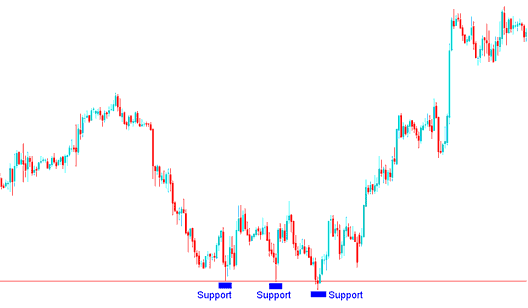
Buy Trade - Stop Loss Trading Order set few pips below the support
- Sell Trade - Stop Loss Trading Order set a few pips above the resistance
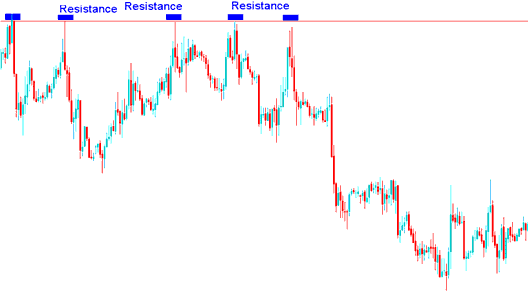
Sell Trade - Stop Loss Trading Order set a few pips above the resistance




